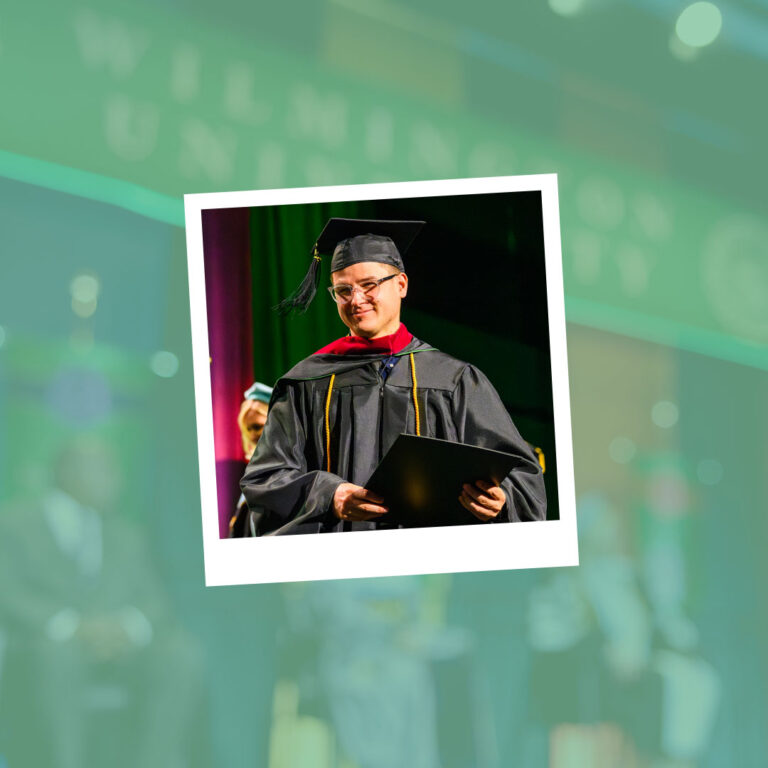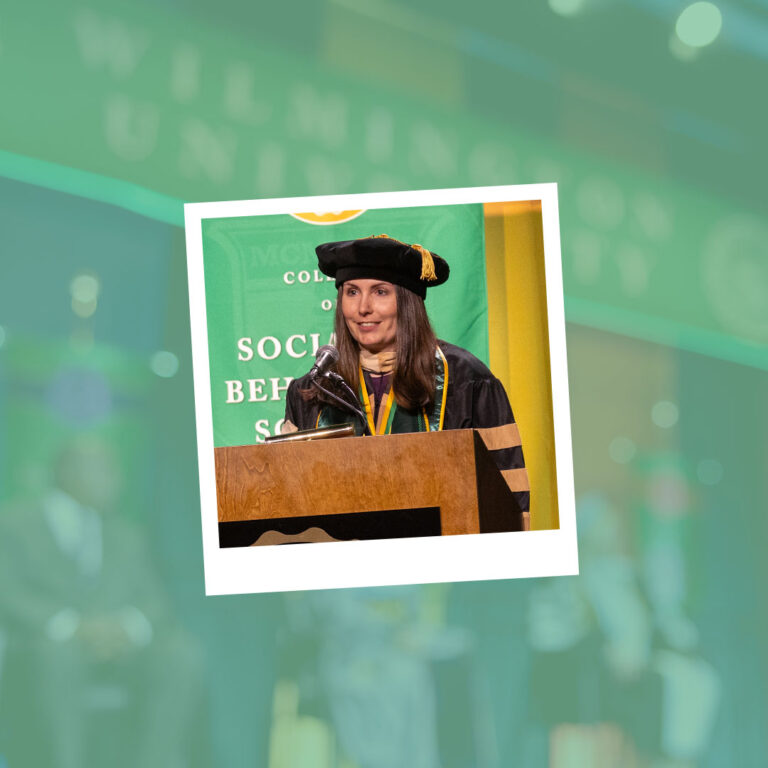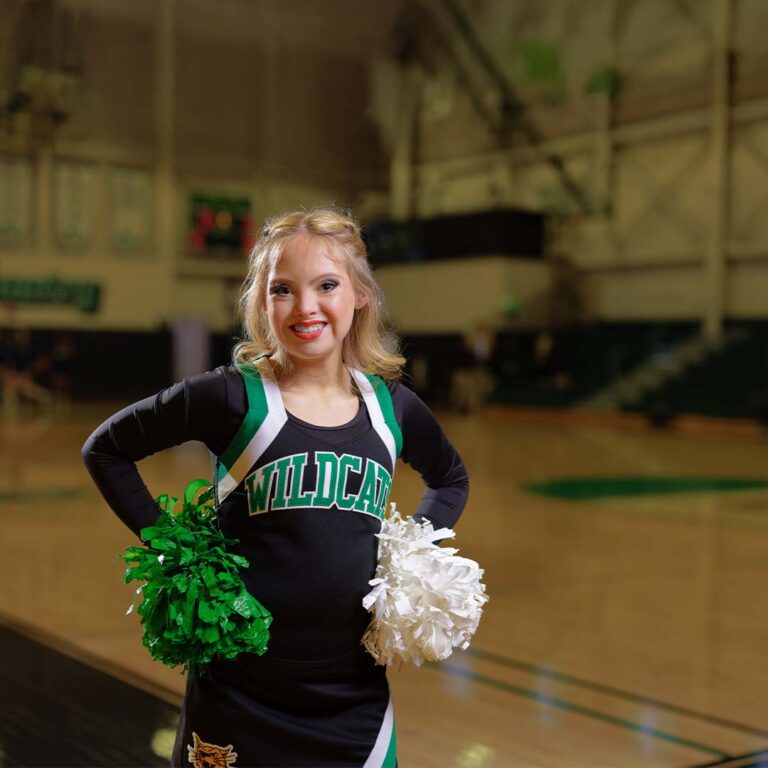A Wish for Haiti
WilmU alumnus Georgeton Charles wants to use his education to help rebuild his native Haiti, a country the world has seemingly forgotten.

On Jan. 12, 2010, Georgeton Charles found himself searching the wreckage to find his father and only brother amid the chaos of the 7.0-magnitude earthquake that had struck his native Haiti.
The quake shattered the developing nation that had already been wracked by conflict, leaving 19 million cubic meters of rubble and debris in the capital of Port-au-Prince, which, the Disasters Emergency Committee would later report, was “enough to fill a line of shipping containers stretching end-to-end from London to Beirut.”
“Mere words cannot express all that happened after that earthquake,” Charles says. “Continuing tremors caused terrible panic and fear. I found it extremely difficult to cope with voices calling out amid the rubble and not being able to help. I looked for my brother and father everywhere, even among the wounded and dead.”
According to estimates from the United States Geological Survey, 316,000 people were killed, 300,000 injured, 1.3 million displaced, 97,294 houses destroyed and 188,383 damaged in the Port-au-Prince area and most of southern Haiti. The catastrophe fueled global headlines for weeks.
“It was more than a news story to me,” says Charles. “It was my life — a life I continue to live despite all that happened to me on that day and since.”
Things happen, he says. “We don’t know why, but we must move on.”
Which is what he did. With help from friends, Charles came to America to study at Cumberland County College (N.J.) and then complete his bachelor’s in business management at Wilmington University’s College of Business. He earned his MBA at WilmU in May.
But Charles never forgot Haiti. In fact, he believes he survived the tragedy for a reason.
Charles was born in Haiti in February of 1988, a turbulent time in one of the poorest countries in the Western Hemisphere. Then-President Leslie F. Manigat was overthrown in a military coup after serving in office for less than six months. Not long before that, elections were canceled after terrorist attacks on polling places. Life was difficult for Haitians, but particularly for Charles, who had lost his biological father, Rayant Charles, when he was 2, and his mother, Francesse Abelard, just six years later.
“I never found out why she died,” he says. “I only knew she was very sick. She was the matriarch of the family and provided us support in many ways. I might not remember everything about her, but one thing I sure remember was that she was the most caring woman alive. She was the person who would go the extra mile to make sure everyone was taken care of.”
Charles had a stepfather, Père Jean, but the two weren’t close — personally or geographically. Jean lived in Port-au-Prince and Charles had moved 20 miles away to the small town of Léogane to live with his grandmother and brother, Frantz. It could take anywhere from two to five hours to travel 20 miles in Haiti by car or “tap-tap” (bus), depending on traffic. Charles saw Jean once every three or four months until the earthquake struck. Both Jean and Frantz were believed to have perished in the quake, though Charles never learned definitively of their fate.
Léogane was, in Charles’s view, one of the friendliest towns in Haiti. “I had lots of friends,” he says. “And by friends, I mean people who actually talk with each other on a daily basis. I can say I almost knew everyone there. However, not many of them knew my story (while I was) growing up, and they would not believe it since I was the kid who always had a big smile on his face.”

According to estimates from the United States Geological Survey, 316,000 people were killed, 300,000 injured, 1.3 million displaced, 97,294 houses destroyed and 188,383 damaged in the Port-au-Prince area and most of southern Haiti.
His spirit is intertwined with his love for Haiti and the belief that he was meant to do something powerful with his life. He doesn’t like to talk about the earthquake, mainly because people tend to feel sorry for him. He’d rather feel hopeful than remorseful.
“I had big dreams growing up,” he says, including finishing high school — which in Haiti takes seven years — then going to a university and running for office. “However, it was not easy for a 14-year-old to even go to high school since the tuition fee was not that affordable. I decided I wanted to have a good job.”
A tailor friend offered him an internship. In six months, Charles was skilled enough to earn enough to afford secondary school, which costs $200 to $400 a year in a country where minimum wage is $5 an hour. Haitian children are required to wear school uniforms, so Charles figured he could earn a living making them. On his free Saturdays, he took classes at the Centre Juvenile Marie Régine du don Bosco, a professional tailoring school. He graduated in two years at the top of his class and started a business.

Then came the earthquake. “On that one day,” says Charles, “I lost my home, my tailoring business, my school, and much of my country as I knew it.”
Haiti has always ranked as one of the poorest countries in the Americas, says Lynn W. Moore, regional chair and history chair in WilmU’s College of Arts and Sciences. “But partly due to a very beneficial trade package that the U.S. Congress had passed prior to the quake, the economy had begun to grow slightly. The earthquake changed all that.”
It left Haitians in peril, and few could communicate with outsiders who had come to help. As aid arrived, the language difference posed an immediate problem, Charles says. “Most of the volunteers spoke English, while the Haitian people generally spoke French or Creole. I speak English, French and (Haitian) Creole.”
He volunteered as a medical translator for an organization called Heart to Heart International. “I saw people, including the youngest of children, in the most critical conditions and witnessed life and death decisions being made that no one should have to see,” says Charles.
Charles met two volunteer registered nurses, Sharon Sparks and Karen Chung, through Heart to Heart. “Quickly they became my family — my mother and my sister,” he says. “They have provided me with the love and support I needed and have made a remarkable difference in my life.”
The nurses helped Charles devise a plan to study in America and pay for his tuition at Cumberland. (Some of the money came out of their pockets.) “Because of them, I was able to finish my associate degree in paralegal studies, was inducted into the Phi Theta Kappa Honor Society, and was even selected to participate in the Student Pathways Leadership Program,” says Charles. “None of this would have been possible if tragedy had not brought us together.”
The Path to WilmU
Charles was accepted to five universities after earning his associate degree. He leaned toward Wilmington University for his undergrad and graduate work because he loved its culture, and his interaction with President Dr. Jack Varsalona clinched the deal.
“The President made me feel like the president,” he says. “He met with me. He always made time for me and we talked about everything.”
Says Dr. Varsalona: “Georgeton, like many of our students at Wilmington University, has the drive to overcome obstacles and make a success of his life. He wants to use his education to make Haiti a better place, and that makes what we do so worthwhile.”
While studying at Cumberland, Charles founded a youth initiative called Another Haiti, which educates, empowers and inspires local Haitians through local events that include yearly art contests and art programs. Students contribute art to a calendar that’s sold in the United States and proceeds go toward school supplies and scholarship funds for the 12 contest winners. Since the quake, Another Haiti has held conferences for young adults in Léogane to discuss progress and problems and began offering seven-week programs in English this summer.
“People from the United States have offered their services to teach English to these eager learners,” says Charles. “I have returned to Haiti at every opportunity during school breaks and am inspired by these events and the enthusiasm I see in the youth with whom I interact.”
Change starts with young people, he believes. And if there was ever a country that needed a new start, Haiti is it. While global, financial donations poured into the country after the earthquake, the world has seemingly turned its back on Haiti. According to Moore, the country is currently dealing with a cholera outbreak that’s attributed to aftereffects of the quake. Quoting from a New York Times article, Moore says that “more than 9,000 lives have been lost to cholera. The nation is still reeling from the effects on its economics, healthcare and politics.”

NPR’s Jason Beaubien reports that governments and foundations from around the world pledged more than $9 billion to help get the country back on its feet after the earthquake, but only a fraction of the money ever made it. About 350,000 people still live in camps or tents. Many, Beaubien writes, “have moved back to the same shoddily built structures that proved so deadly during the disaster.”
This is where Charles’s education comes in. He will put to use the skills he acquired while earning his MBA and concentration in organizational leadership. Dr. Clint Robertson, WilmU’s director of MBA graduate business programs in the College of Business, says that Charles’s “initiative and enthusiasm for taking entrepreneurship and education of youth to Haiti as a nation-building tool are truly an inspiration to his fellow students as well as faculty.”
It’s no doubt an inspiration to Haitians as well. Charles has grappled with hardship like they have. But he’s also found a path to salvation that’s been fortified by education. While earning his degrees, he managed to run Another Haiti and rebuild his tailoring shop, Alelouya Chòp Kouti, where he oversees a five-person staff. He plans to work in Haiti for a period of time, but has every intention of returning to WilmU to earn his DBA.
There’s a reason that Charles thinks he survived the earthquake. And it involves his training at WilmU.
“I believe the more education I have, specifically in the leadership field, the better it is to impact others for the better Haiti that I dream of,” he says. “That is what I was born to do.” WU



